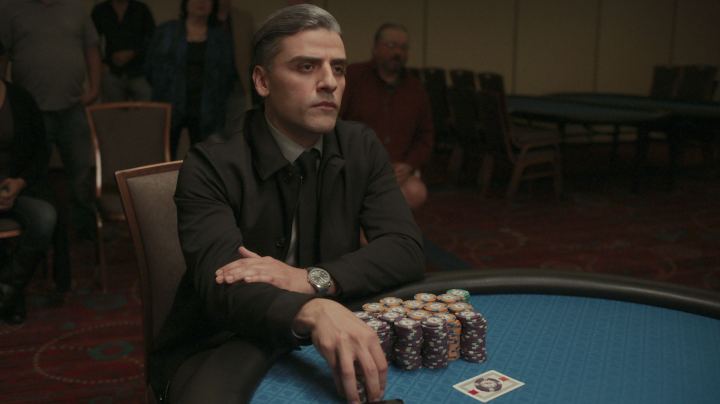Oscar Isaac Cashes in With ‘The Card Counter’ Performance

Courtesy of Focus Features / ©2021 Focus Features, LLC
On the surface, William Tell (Oscar Isaac) is a card counter who is reserved and methodical. He travels casino after casino where the tables change, but the game does not. His play is modest and measured, and so are his wins. That is by deliberate design: the least amount of attention, the better.
But, audiences know that exceptional stories are rarely told on the surface. That is certainly the case for the story of William Tell (not his real name) in The Card Counter, written and directed by Paul Schrader (First Reformed).
At the start of the film, you’ll get a crash course in card counting. Call it a “Card Counting 101,” if you will, and it is a doozy of a scene. It’s one of the more engaging casino scenes to appear on the screen. But a minor scratch at the surface, and you’ll soon learn William is not who he appears to be and is hiding from his past.
Scratch a little more of the surface, and you’ll soon learn his past is one of the most significant stains on the American military in recent times. His former life is that of a former military man at Abu Ghraib in the post 9/11 era. William Tell was formerly Private First Class William Tillich, and while serving at Abu Ghraib, he was ordered to engage in interrogation techniques that crossed the lines of torture. His behavior would land him behind bars, where he was sentenced to eight-and-a-half years and consequently used that time to learn a new skill: card counting.
Once free, he began gambling, moving from one card table to another. It’s at one casino in middle America that William comes across Cirk (Tye Sheridan). Before long, he is teamed up with La Linda (Tiffany Haddish), and the trio becomes a surrogate family traveling up and down the coast in search of big payouts.
What stars as a movie about playing cards turns into a film about military torture and its lasting effects. Present scenes are rich with energy and emotion. You will feel like you are sitting at a table on a casino floor — so much so, that you can smell the smoke. Rewinding, the scenes shot of Abu Ghraib are vivid, violent, and jarring. You will wince and cringe at this part of America’s past. However, stitching both extremes together of the past and present is part of The Card Counter’s visionary approach. And that is due in large part to Oscar Isaac. On the surface, his character appears to be a quiet, if not an ambivalent, individual. His cold and calculated delivery becomes mysterious. His monotone delivery is packed with an undertone that makes you cautious and, at times, frightened. Uncover the layers, and the mystery becomes terror. Isaac shines in this role.
The casting of the leading trio feels a bit off. Every set of pairs in this movie, be it Haddish and Isaac, Sheridan and Isaac, or Isaac and Sheridan, have considerable chemistry. But when all three are put together, the sense of the scene is uneven. It’s like having peanut butter, chocolate, and jelly. You can make great things with any two of the three, but all three are just ‘eh.’ Also, you’ll need to look past the Vegas-style marketing of the film and know that The Card Counter is not as marketed. It’s so much more than casino chips and cocktails, and it’s actually one of Oscar Isaac’s best roles yet.
The Card Counter is rated R and releases on September 10.